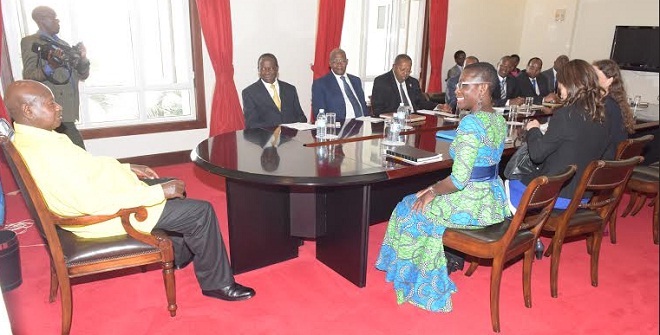
For a historical perspective, in 1990, average debt service in Sub Sahara Africa was 50% of export earnings. Some countries debt service obligations exceeded their export earnings. IMF and other donors were always rescheduling these debts for countries in this region continually but our countries could not pay. By 1989, more than 100 loans had been rescheduled without making our countries solvent.
One cannot analyse debt sustainability without looking at a nation’s financial assets i.e. its net debt (total debt minus financial assets). If a country has a lot of foreign exchange reserves or a sizeable sovereign wealth fund, it means it has money it can draw to pay its debt obligations. Uganda has $3 billion in foreign exchange reserves, which makes our net debt $7.5 billion.
Finally we come to the issue of the debt burden, which is the ratio of debt service to revenue. The higher the percentage of debt service to public revenues, the greater is the debt burden. Uganda’s total debt service is Shs 2.8 trillion which is 15% of revenue! Given that Uganda also gets grants from donors, this reduces her debt burden. Of course one can say that donations cannot be part of such a calculation. But that would be a technical argument. As long as one has generous benefactors willing to pick some of his/her bills, their debt burden would be low.
Finally, Hyuha’s arguments are not without merit. There are many cases of mismanagement of foreign loans, corruption, delays, etc. some of which Hyuha quotes from an IMF assessment. Indeed, in my article I mention some. While it is important to point out such weaknesses, it does not vitiate the fundamentals.
I am aware that many Ugandans are frustrated with President Yoweri Museveni’s long and corrupt rule. This has led many of our intellectuals to imagine that things must be going badly for our country. This is partly correct. However, in many cases this is often not true!
Absolute success, more than absolute failure, is what drives these frustrations. The problem with very many Ugandans could be with the relative success. When they look at those around them who are doing well, they feel left behind even when their own circumstances have improved in absolute terms.
****
 The Independent Uganda: You get the Truth we Pay the Price
The Independent Uganda: You get the Truth we Pay the Price




Uganda’s debt,both foreign and local, or even the foreign alone is not sustainable, will not and cannot be repaid. With benefit of hindsight it might be scrapped when the creditors realise they won’t collect and opt to remain friendly instead of losing the money and the ‘friend’. Mwenda knows why debt is incurred and how difficult,(the difficulty similarly to winning a bronze medal in Olympics) it is to repay. It is theoretically possible but in practice no. I will here list a few reasons to support my conclusion.
1. While it is said Uganda owes 10.5 bn USD, you seem to hoodwink readers that the Congolese debt (imposed by ICC judgement) is not debt, just because DRC is quiet temporarily so Uganda’s debt is 20.5 bn USD and climbing fast. What about the ‘asset’ the military want and must get?
2. To say a revenue will materialise and then ore money be available to service debt is as childish as to say it might rain ‘dollars’ and the greedy will have been satisfied….. Mwenda seems not to see how (i) newer and more beautiful girls are being born (ii) better and faster cars are being designed (iii) newer and deadlier diseases are being incubated (iv) appetites for newer and better houses and apartments in Europe and Dubai are being sharpened……so any newer source of revenue would just dry enroute before reaching the treasury. Greed and its attendant curse are here to stay and grow….. the more wealth, the more kidnappings will take place; some done by police even.
3. To place hopes on oil is naivety of the worst kind. The oil is still in the ground. No Ugandan has seen it so a likelihood of these white men fooling us of its presence wouldn’t be first nor last. No refinery yet and these postponements change budgets and other costs upwards. The pipeline is not even surveyed and is still in dream-stage. Theft of material alone will double the cost and corruption will do the rest…..that fabulous oil, if oil there is, will cause more pain than Naija and will take the country 30 years backwards to the level of Central Africa where militia will reign and government will disintegrate….wait for it to start flowing if it ever will. to say it will pay the debts is like placing hopes in a 12 year old school-girl that in 5 years you will get some food from her prostitution. And suppose technology invents newer better means to do what oil does? With Ugandans’ way of doing things, it won’t take long before pollution of the lake and Nile waters becomes intolerable then killing of marine life and the next thing you hear, WHO advises that it be abruptly stopped…..even Male Mabirizi can sue up to the International Court of Justice and the next thing you hear is orders that the holes be sealed at defendant expense.
4. To prove this by simple arithmetic, it is known that person who earns 2m UGX monthly cannot repay a 800k UGX debt in his lifetime when (i) the currency is being inflated (ii) he marries another wife (iii) the employer is extorting some of the salary (iv)enters into childish quarrels and the neighbour blocks route by which he used to go to work (v)is aging and befuddled (vi) dishonest and all partners have no trust in him.
All these reasons or just one of them is enough to create chaos enough to default on debts.
Mwenda, i wonder if you ever re-read some of the texts you publish before you publish them. I don’t entirely deny that you are a good analyst and writer. But sometimes the things you write don’t make any sense to the common reader in Uganda. Your response to Prof. Hyuha is written, at best like a paper presented at one of the stupid world economic forum and worst from out of this world. You slapping the public with statistics and trying to prove your worth at economics and so forth doesn’t make most of us get the answer to the simple question ” is the coffin proportional to the body?” Simple! And i think Hyuha attempted to argue it out in the simplest, easy to grasp way. Thanks to his profession. He knows his class. You now better than most of us Andrew that beyond the “simplified” figures and %s you paint for us here, much of it doesnt make it to the service and good of the public. It is shared among the selected few and what do the majority have to do? Your guess is as good as mine.. I am your reader but my advice to you is that you should remember that if you are writing for “all” to read and that is if you really do, please do your analysis and reasoning in English, the kind which is taught in Ugandan schools, which i am sure yoh must be so familiar with.
hmm
Thank you Mwenda for a good article your arguments are right but I can only compare you to Dr.Besigye when campaigning he tells people corruption, fairness, justice etc which are good but not easily understood then the village mzee comes boon bagagawale,boons basome,boons bagemwe,oruyongoyongo etc these are silly slogans but easily understood by villagers a reason to why Museveni wins but if he was in the west it would be hard for him.I would advise you to remember your audience as you are writing.
In reply to the last comment. You’re giving to much credit to Mwenda, first, by comparing him to Besigye and secondly, to think that he doesn’t consider his audience before/when writing. He does, only that his intellectual boundaries are limited from breaking down his “macro” idealism to the actual life realities that afflict the common man.
Hi Andrew, kindly I hardly miss your articles and for the first time participating in this page of responses. to be honest with let us give credit to Prof, his article I read and as a non-economist to me it was down to earth material not book abstract theories as u suggest. for instance, Prof. did not use complicated economic equations, he illustrated using I D+R+C easy to understand and applicable to any borrower even a trader in kikubo market.
lets shade light on Prof’s argument by comparing Uganda and Vietnam debt investment model. early years of NRM in power 1986-89 Vietnam delegation visited Uganda to bench mark coffee production. in that period Vietnam was producing average 451,000 bags while Uganda 2,800,000 bags. Vietnam delegation went back borrowed money to invest in irrigation to produce coffee. truly as Vietnam was also borrowing for public infrastructure projects but it was linked with production to earn forex to service the debts. by early 2000/2001 comparison Vietnam had become the Second World Coffee producer up to today next to the giant Brazil, in particular by 2012-13 Vietnam was producing 11,600,000 bags and Uganda 3,700,000 bags (source International Coffee Organization Report 2014). Three weeks back a team from UCDA (Uganda Coffee Development Authority) officials returned from Vietnam on a bench-marking tour for coffee production.
Bwana Andrew, where is our problem, is this Prof. simple equation trying to illustrate how to finance our sustainable debt.
Please as stated earlier I am not economist and save me from a barrage if I happen to have trodden on dangerous waters.
AKUUME
DR. Michael MUGABIRA
Mr. Mwenda, Uganda paid 10 trillion in debt service in the 2018/2019 budget which makes for 50% of revenue collection. In your article, you say it is 2.8 Trillion! This is DISHONEST and MISLEADING.
https://www.parliament.go.ug/news/3016/over-half-govt-revenue-pay-public-debt
I think Andrew was talking about interest on the debt. The debt repayment has principal in there and here making it a higher figure
1.Ooh My God;did you listen to M7’s address on Labour Day?he emphasized the role of businessmen in the development on nations nations are what they are coz of economics,science and business.
2.Most governments acquire loans whose payback terms are flexible.
3.Most loans government acquire are meant to fund projects that will benefits many generations to come.
4.Many people think that Banks charge high interest just to make money .I am an Investment consultant i ways advise people to consider the long term benefits of an investment that was funded by loan.Just imagine if person x obtains a loan of 100m,pays back 45m to the Bank but later on his investment is worth billions of shillings will the 45m that the bank charged as interest matter to him?
5.Loans are a forced saving coz this is money that you spend in advance.
6.The Jubilee debt campaign spear headed by celebrities like Bono were advocating for the rich nations to cancel debts to nations like Greece ,Ghana and other 3rd wold nations may be they reason that way coz they think that nations can develop on charity which is not the case nations have developed coz of hard work,science and technology.
7.Bob Wine or Fresh kid can become presidents of Uganda thanks to M7 whose main focus is to establish development projects and systems that will stand the test of time even when Ugandans elect unserious people to governor them he knows that Ugandans are jokers thats why he cant leave power now.
Mr. Rwasubutare, I think you are arguing about a different things than what Mr. Mwenda was talking about. Your concern seems to be corruption and how the revenues wont reach the treasury by some greedy individuals whereas Mwenda was about Uganda’s ability to service both domestic and foreign debts and his numbers do not lie. We cannot be so pessimistic about out country’s development.
How I wish you were right.